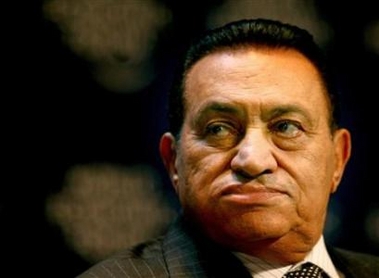This will be a quick update:
From what we are told Ambassador Frank Wisner travelled to Cairo and met with Mohammed El Baradei first. After this meeting, he has met senior Egyptian officials to convey messages from the White House. The white house wanted Mubarak to step down immediately and allow the Army to control Egypt during the transition period until elections in 2011. We believe that this is so that the US and Israel are given enough time to decide the best course of action. Israel was infact, against the decision to ask Mubarak to step down, they see Mubarak as a guarantor to the 1979 Camp David accord. US and Israel must be increasingly interested in seeing Omar Suleiman stay on.
We feel that it was unlikely that Mubarak would have wanted to stay on as President anyway, in light of his health condition. Mubarak wanted to pass on the presidency to his son Gamal in the previous elections.
Iran's position
The editor does not doubt that Iran will attempt to increase its influence in Egypt. Iran must already be making plans for action such as approaching members of parliament who are considered to be pro-Iranian. Iran will try its best to expand influence and perhaps fund election expenses for pro-Iranian members (or parties) to be elected into Parliament. This would naturally draw GCC into this quest for influence over Egypt. We expect to see a similar situation to Lebanon where the Kingdom of Saudi Arabia spent a huge amount of money (rumours state that these are around a $1billion) on helping Saad Harriri become re-elected. As it stands, Israel appears to be the most worried of the situation, and as much as the GCC, it may be Israel that will step in to help a pro-Israeli party to be elected.
Saudi Arabia was not shy to protect its interests in the current Egyptian unrest. Reports have been received that King Abdullah had set up a team comprising of Security and Military officials to keep an eye on the situation in Egypt. If the situation was to further deteriorate, it would have seen KSA send in troops to take any US made equipment. The editor feels that this is to protect KSA from having these weapons be used against them.
The Future
We at the blog see it as imperative for US and Israel to continue to back Omar Suleiman, who is seen as a man that Israel and the West can do business with. Omar Suleiman handles numerous complicated issues on behalf of the Mubarak regime - especially the Palestine file. Naturally this see's Omar Suleiman making regular trips to Tel Aviv.
Oman and UAE Spy Issue
Oman uncovers 'spy network but UAE denies any link
http://www.bbc.co.uk/news/world-middle-east-12320859
The authorities in Oman say they have uncovered a network of spies working for the United Arab Emirates, according to the state news agency.
The alleged agents for the UAE are said to have spied on the Omani government and military.
The UAE government denies any knowledge of - or link with - such a network, according to its news agency.
The neighbouring countries are members of the Gulf Co-operation Council and normally enjoy good relations.
Government sources in Oman say the ring was discovered some months ago and that a number of Omani nationals have been arrested.
The spies may have been interested in the issue of the succession of Oman's Sultan Qaboos, according to a security official quoted by the Agence France-Presse news agency.
The sultan is 70 years old and does not have children.
But others suggested the alleged spy ring could be more related to regional politics.
"One possibility is that the UAE wants to know more about Iran-Oman relations because of Tehran and Muscat's long ties in security and military co-operation," Theodore Karasik, from the Institute for Near East and Gulf Military Analysis, told Reuters news agency.
Oman has close relations with Iran, partly because the two countries are joint gatekeepers of the Strait of Hormuz, the route for 40% of the world's oil tanker traffic.
But the sultanate also has strong military and diplomatic ties with the West.
The UAE is a staunch ally of the United States.
UAE authorities received the news with "shock and surprise" according to the Wam news agency.
"The UAE expresses its full willingness to co-operate with... Oman in any investigations that it carries out in full transparency to uncover (those) who try to mar relations between the two countries," said a foreign ministry statement.
Editor can reveal that the spies arrested were working for the UAE State Security services under the control of Hazza Bin Zayed Al Nahyan. The target appears to be senior members of the government, specifically members who appeared to be too close to Iran. The members infiltrated the Cabinet, military and the ISS (Internal Security Service). Rumours circulating appear to place the number of people arrested at 15.
Abu Dhabi and Omani intelligence officials have met several times since the arrests in order to discuss the issue, but talks appear to have broken down. Hence the release using the official Oman News Agency.
HM Sultan Qaboos had refused to travel to the GCC Summit held in Abu Dhabi, this was indeed due to learning of the arrests of the spies.
It is no secret that several members of the cabinet including the Foreign minister are favouring increasing political, economic and military ties with Iran. This may have been the reason why the Emirati's had decided to increase intelligence gathering in Oman.
The retaliation from the UAE have included sending back several senior Omani army officers serving in Emirati ranks (as is common in the GCC military's). Oman suspects that several of these officers will continue to stay in touch with Emirati intelligence.
Thanks for reading.


No comments:
Post a Comment